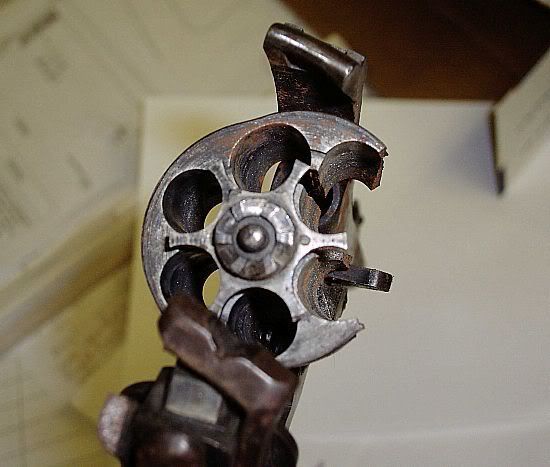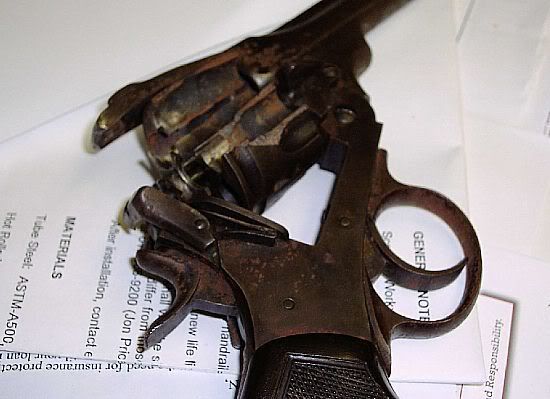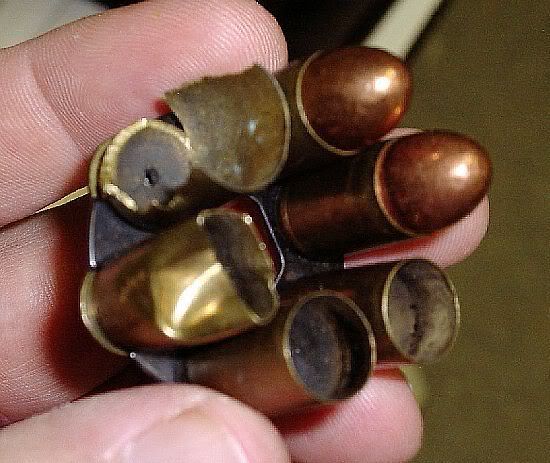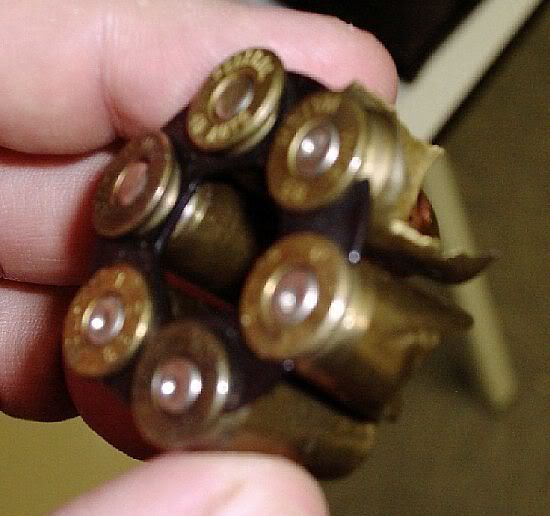Page 1 of 1
When guns fail
Posted: Mon Nov 09, 2009 8:59 pm
by winnie_the_pooh
Re: When guns fail
Posted: Mon Nov 09, 2009 10:08 pm
by TwoRivers
True, Winnie. But in the case of an 8x57 fired in an 9x57 nothing can happen, except that it probably can't be good for the rifling; and you'd need the broadside of a barn to catch the bullet. So it must be about making noise. Cheers.
Re: When guns fail
Posted: Tue Nov 10, 2009 6:58 am
by winnie_the_pooh
TwoRivers wrote:True, Winnie. But in the case of an 8x57 fired in an 9x57 nothing can happen, except that it probably can't be good for the rifling; and you'd need the broadside of a barn to catch the bullet. So it must be about making noise. Cheers.
I always thought that case ruptures are not very good?
Re: When guns fail
Posted: Tue Nov 10, 2009 11:54 pm
by TwoRivers
Case ruptures are bad indeed. But the 9x57 is the 8x57 with the neck expanded, all other dimensions are exactly the same. In goes an 8x57 cartridge, fire, and out comes an empty 9x57. It's when the base diameters differ, and the case does not obdurate,but splits, that bad things happen. You have to know what you are doing.
Some forty years ago a 10.9x49mm wildcat cartridge had some popularity in the Upper Midwest, a .308 Winchester necked up to take .44 caliber bullets, a rimless forerunner of the .444 Marlin, pretty much. The originator got his cases by firing 7.62/.308 cartridges in a .30-06 rifle. With less taper than the .30-06, the .308 would only just go far enough into the longer chamber. Out would come a perfectly straight case, ready to be trimmed and reloaded with .44 caliber bullets. I never thought that a particularly good practice; nor a rimless rifle cartridge that headspaced on the case mouth like pistol cartridges, but it worked. Cheers.
Re: When guns fail
Posted: Wed Nov 11, 2009 12:56 am
by MoA
Shooting an 8x57 in a 9x57 will damage the rifling, and fireform the case to 9x57. Not reccomended, but can be done if you dont care about damaging the rifling. Now shooting 9x57 ammo in a 8x57 is a sure shot disaster.
A lot of bench rest shooters fireform the .220 Russian to 6 PPC, with powder and a paper or wax bullet. And almost all wildcat cartridges require fire forming. For fire forming .260 AI cases, I would use a shot out barrel, with a load of fast pistol powder under semolina, capped with tissue paper.
The failure in the picture was most likely cause by a double charge if the cartridges are hand loaded. Could also just be a weakened cylinder, or something like trying to light off .357 Mag cartridges in a .38. But first suspect would still be too much powder. The revolver looks to be a .45 auto, which is a case that is very easy to double charge.
Just read the thread the pics are from...
More or less certain it is a double charge. Which will do that to most guns. Not quite the same as the 8x57 issue.
Re: When guns fail
Posted: Wed Nov 11, 2009 8:59 am
by winnie_the_pooh
Firing 8x57 ammo in a 9x57 rifle may not be dangerous for the person firing it.However,in India where there is no possibility of getting the barrel changed and considering the high price of firearms in the country,recommending it to some one else is not very good.
In India there is a tendency to stuff whatever can fit in the chamber in case of firearms for which finding ammo is difficult or the other ammo is cheaper.Some examples
7.62 in a 8x57
303 in a .315 IOF
9mm para in .38 super pistol
.315 in a 11mm Mauser
303 in 405
303 in a .32-40(with the chamber slightly modified)
Re: When guns fail
Posted: Wed Nov 11, 2009 11:19 am
by hvj1
MoA,Winnie-the-Pooh,Two Rivers
Thank you guys for the highly informative and useful info.
Regards
Re: When guns fail
Posted: Wed Nov 11, 2009 11:42 am
by mundaire
Just checked out the link to the thread posted by the OP, the chap who posted the pictures on that thread has this to say:
This is a "shaved" MkVI Webley which was being fired with standard and match grade .4ACP factory loads when it let go. (The rust is from the intervening years of storage since the incident.)
The MkVI Webely was designed for maximum operating pressures in the range of 11,000PSI ... but standard .45ACP loads generate in the range of 16,000PSI - which is approximately the PROOF pressure for the Webley.
If a steady diet of proof loads doesn't eventually blow up one or both of your revolvers, they will almost certainly shoot loose over time.
On the other hand, with loads approximating the original service loads, Webleys are a positive joy to shoot.
Re: When guns fail
Posted: Wed Nov 11, 2009 3:10 pm
by TwoRivers
Winnie: No.1 won't hurt the shooter, nor the rifle. But probably not a very good idea for the rifling, if done routinely.
No.2 dangerous for shooter and rifle, as chamber is larger then cartridge.
No.3 probably o.k. and no damage to gun or shooter
No.4 bad idea as chamber is somewhat larger, and headspace is very much larger.
No.5 safe enough, case has same base diameter and seals chamber.
No.6 safe enough, depending on the type of rifle, but not going to be accurate. Have seen this done in Afghanistan with .32-40 W-R Martinis. And, no, India isn't the only place where this kind of stupidity can be found, it's done in the US as well. You'd be surprised what can be found at a rifle range. Cheers.
Re: When guns fail
Posted: Sat Nov 14, 2009 10:13 pm
by timmy
My favorite story regarding this was the one about a fellow who took a war surplus Japanese Arisaka bolt action rifle and had it rechambered for .30-06. He complained that it kicked a lot.
When the NRA had the rifle examined, it turned out that the "gunsmith" (and, please note, I use the word very loosely!) who had reworked the rifle saved money by not reboring the barrel for the .30 caliber bullet -- he just ground down the pilot of the chamber reamer and resized the chamber to accept the .30-06 round.
So, chambering a .30-06 round in the rifle forced a 7.62mm bullet down a 6.5mm bore every time the rifle was fired! The NRA even tested the rifle and found that it would, indeed do this!
This is proof of the truth of the sayings, "It takes all kinds" and "Truth is stranger than fiction."
Re: When guns fail
Posted: Sun Nov 15, 2009 11:07 am
by shooter50
The arisaka action is known for its strength probably the strongest war time action. Forcing a larger diameter bullet down the bore dangerously increases pressure and is not advisable.
Once a couple of decades ago I was hunting outside this country with an elderly gentleman who was a very good shot. An American and a great fan of American chamberings he had a 30 06 and a 270 win custom built by Griffin and Howe. Both rifles had scopes and he was using hand loaded ammo (Which I was told were more accurate) One afternoon we set out, he with his 30 06 and i with my old 9 X 56 Mannlicher, while i managed to get a few lucky shots he couldnt hit a thing inspite of the superior rifle, scopes and ammo. Later it turned out that he had been shooting his 270 win hand loads in 30 06. The 270 win is basically a necked down version of the 30 06 so that the difference is unnoticable but the bullets cant get the twist in 3006 bore and hence the inaccuracy.
When a smaller dia bullet is fired in a larger bore sometimes the bullet exits without touching the rifling at all. I once examined a 318 westley Richards in which the owner had been shooting 30 06 ammo. The chamber showed wear because of the different sizes of the cartridges but the rifling was practically new as the .308 inch dia of the 30 06 bullets exited without practically touching the rifling in the .333 inch dia of the 318 westley richards.
Woulnt advise this as routine practice though, but hunting in India is out of the question now and target shooting with a 9 x 56 is not fun either
This should answer Winne or else read Alexander Pope, An Essay on Criticism, lines 215-218
Re: When guns fail
Posted: Sun Nov 15, 2009 2:49 pm
by winnie_the_pooh
When a smaller dia bullet is fired in a larger bore sometimes the bullet exits without touching the rifling at all.
Any empirical data to back this up.I would imagine the bullet rattling down the barrel rather than flying in a true straight line parallel to the bore till it exits the barrel.
I once examined a 318 westley Richards in which the owner had been shooting 30 06 ammo. The chamber showed wear because of the different sizes of the cartridges but the rifling was practically new as the .308 inch dia of the 30 06 bullets exited without practically touching the rifling in the .333 inch dia of the 318 westley richards.
How did you examine the bore and how did you measure the wear in the chambers? I mean gauges,instruments and the like.
Re: When guns fail
Posted: Sun Nov 15, 2009 11:07 pm
by timmy
shooter50:
Forcing a larger diameter bullet down the bore dangerously increases pressure and is not advisable.
I appreciate your understated sentiment. Also, Pope's insight is certainly applicable to such matters.
Re: When guns fail
Posted: Mon Nov 16, 2009 12:29 am
by TwoRivers
Shooter: What exactly constituted that "chamber wear" you detected? Just curious.
Re: When guns fail
Posted: Mon Nov 16, 2009 10:14 am
by marksman
Shooter58,
I Ended up shooting very badly on one of the shooting expedition in early 70s and had to face the nasty digs of fellow shooters all the time in the camp. Recently, came across the same box with some left over cartridges and realized to my horror that some of them were 100 gr . 270 Winchester ammo mixed with 110gr 30-06 ammo. I wasn't even aware of how a 270 ammo looked like then and hence could not pick the difference in a box of twenty which was sold to me much cheaper then the rate that existed then. Luckily after missing a couple of fairly easy targets, I didn't shoot at all out of sheer

embarrassment and unknowingly managed to save my then brand new FN Belgique 30-06 from damage. This should serve as a warning to green horns. Always check the head stamps on the ammo before shooting it. Don't just trust it by shape or by the the packing alone.
Cheers !!
Marksman







